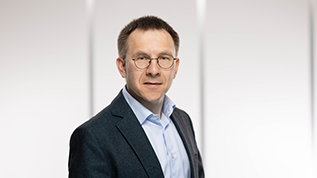Use of cookies
Cookies help us to provide our services. By using our website you agree that we can use cookies. Read more about our Privacy Policy and visit the following link: Privacy Policy
Demographic change will have a major impact on our working world. We are living longer today and are often healthier in old age than many generations before us. Dr Andreas Mergenthaler, head of the research group Individual and Social Ageing at the BiB, focuses on the social potential of older people and researches labour market participation in retirement age. The ageing researcher contributed his expertise to the statement "The Future of Work" by the German National Academy of Sciences Leopoldina and the Union of the German Academies.
Dr. Mergenthaler, how should we understand work in the future?
 Dr. Andreas Mergenthaler
Source: © BiB
Dr. Andreas Mergenthaler
Source: © BiB
In any case, we should think about a new and more comprehensive definition of labour. What is valuable to us as a society? Not only paid work, but also unpaid activities such as voluntary work strengthen social prosperity, social cohesion and solidarity between the generations. Various developments such as digitalisation, the moveing away from fossil fuels and demographic change are changing the world of work and require a rethink.
As an interdisciplinary working group with researchers from very different disciplines, we therefore propose the term "activity society" to broaden the concept of "labour society". In doing so, we are emphasising the view that gainful employment should be seen more in conjunction with other activities, such as voluntary work or care work within the family.
This is becoming increasingly important, particularly in view of demographic change, as the baby boomers are reaching retirement age. This will pose major challenges for the labour market and social security systems over the next 15 years.
Your research shows that the life courses of older people have changed. Employment plays an important role in this. What does this mean for our understanding of being active in old age?
There are virtually no social blueprints for life after the mid-60s. However, it is becoming increasingly common to work beyond the statutory retirement age, partly due to the years of good health gained. In our study "Transitions and Old Age Potential" (TOP) at the BiB, we asked why people continue to participate in the labour market even if they have already passed the statutory retirement age. Although financial reasons play an important role, interestingly, contact with other people or the enjoyment of work is more important for many. This shows that the continuation of such activities is by no means only motivated by economic reasons. In addition, prolonged employment means that the transition to retirement is becoming increasingly blurred. As a result, we are observing an extension of the "productive" middle age, in some cases into the eighth decade of life.
In order for society to benefit from the activity potential of older people, the traditional three-part life course of education, gainful employment and retirement should be made more flexible. This requires a model that improves the compatibility of different activities in all phases of life, especially in the resource-rich "third age".
Employment, caring for relatives, looking after grandchildren - older people are active in many different ways. What challenges does this pose and what does the interdisciplinary group of experts on the future of work recommend?
Due to an increase in employment rates, particularly among women aged 50 to 64, there are also increasing problems reconciling gainful employment and family care work, such as looking after grandchildren or caring for a relative, during this phase of life. This phenomenon poses major challenges for both the labour market and family policy.
More flexibility is therefore needed when it comes to balancing care work and paid work. Increasingly longer working hours and the growing need for care at home can lead to conflicts. This is because the vast majority of persons requiring care are looked after within the family, mostly by women. The inequalities associated with this could be alleviated by a more equal division of care and gainful employment between the sexes. In view of the changing framework conditions in an ageing society, such measures are necessary in order to fully recognise and tap into the potential of an active society at every age.
To this end, it would be worth taking a look at the entire life course. The still relatively rigid sequence of education, work and retirement could be broken up with the aim of organising these phases more in parallel. This would make it easier to reconcile different activities regardless of age and adapt activity biographies to the increase in life expectancy.
Background
The scientific statement "The Future of Work" was published in mid-January 2024 and is a joint contribution by the German National Academy of Sciences Leopoldina and the Union of the German Academies of Sciences and Humanities under the leadership of the Berlin-Brandenburg Academy of Sciences and Humanities. The academies provide independent, science-based support to politics and society in answering future questions on current topics. Its members and other experts are scientists from Germany and abroad.
BiB research group leader Andreas Mergenthaler was responsible for the third chapter "Demography and life course-oriented labour market design" together with Axel Börsch-Supan and for the sixth chapter "Gainful employment and care work in an active society" together with Katharina Wrohlich.